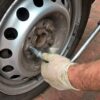How to avoid breakdowns during the winter months
A typical Northern Ireland winter’s day could see frost, sunshine, rain, fog and snow; all can impact your travel plans and your car.
It’ll come as no surprise to you that most of the breakdowns in Northern Ireland happen in the winter.
That’s because as the temperature drops and people are more inclined to stay indoors, their vehicles are left parked up for more extended periods.
And winter brings early nights to the country, so hazards such as potholes are increasingly hit by cars, causing tyre blowouts and other damage.
In 2019, PSNI statistics revealed that 2,871 people were killed or seriously injured (KSI) or slightly injured in the winter months.
While winter is a challenging time to drive, there are things you can do to avoid breakdowns.
Prepare your car for winter
The more frequent that cars are left parked up, the more likely the battery will fail.
Keep an eye on your car’s battery, and if you notice it becoming hard to start your car in the morning, it might be a good idea to take it to a mechanic to get it checked over.
Check all of your lights (brake lights, indicators, full beam, dipped lights, hazard lights and fog lights).
Your vehicle’s lights become even more critical in dark winter driving and remember, it’s illegal to drive in Northern Ireland with faulty lights on your car.
Ensure your car’s fluids are adequate: engine coolant, antifreeze, screen wash should all be topped up in preparation for winter driving.
Before you turn the ignition
Make sure all of your windows are free from ice, dirt and condensation.
Car windows covered in condensation, dirt or ice seriously impairs your visibility; turn the heating on in your vehicle, and de-ice all windows and both side mirrors before you leave the house.
Check you have enough fuel for your journey
Running out of fuel is one of the most common, yet entirely preventable reasons for winter breakdowns.
Drivers forget that harsh winter weather leads to slower driving and traffic jams, delays and diversions; don’t overestimate the amount of fuel you have to make a journey.
Don’t fill your car to full as its weight leads to higher running costs; aim to have your fuel between a quarter and half full throughout the winter to be on the safe side.
Think about your journey before you leave the house
A good idea before making any winter journey is to check the weather forecast.
It’s probably a safe bet to assume that the weather will be horrible but if you’re planning a long winter journey, check the weather forecast before you leave the house and prepare accordingly.
For example, if the weather forecast predicts heavy rain then bring a raincoat with you; it’ll come in handy if you break down.
Also, visit the Traffic Watch NI website; it’s great to check for traffic delays, diversions and road issues.
NIBA is a collective of independent repairers operating in the car and light commercial vehicle market in Northern Ireland. If you need help with vehicle repairs.




